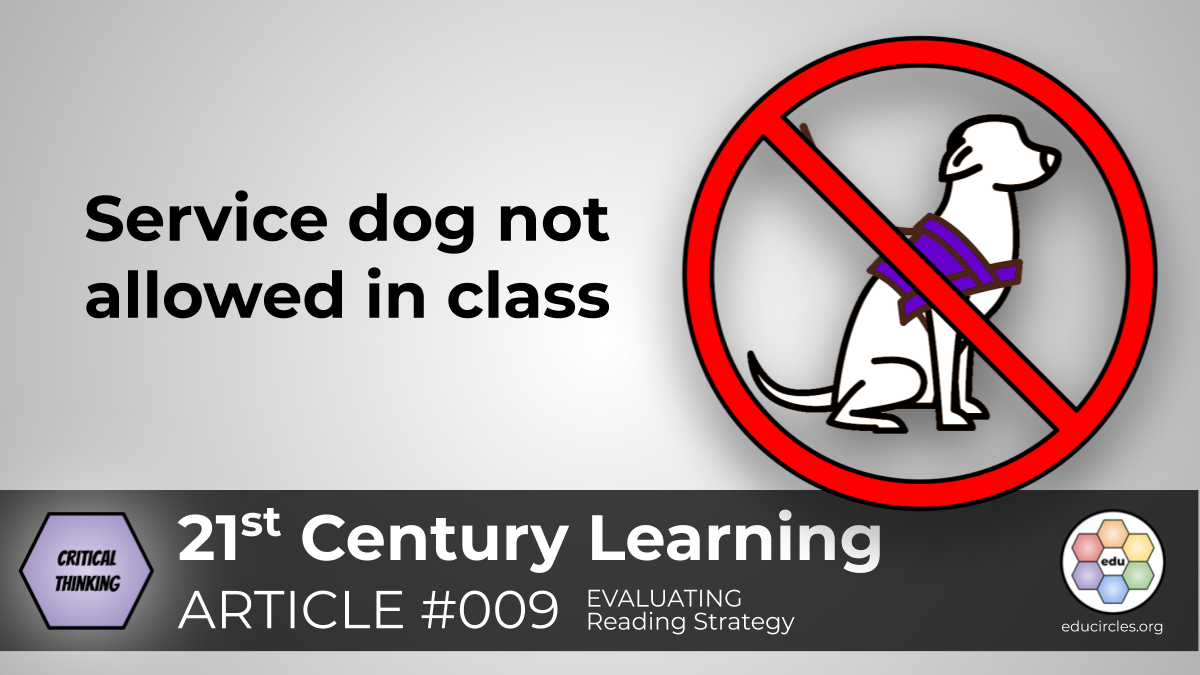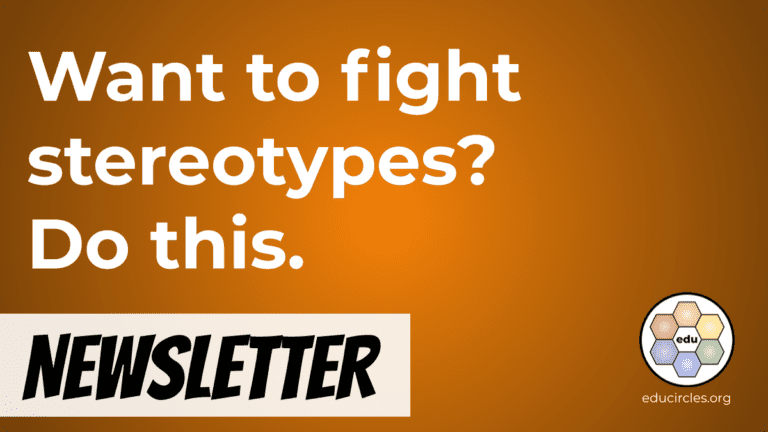Service dog not allowed in class: Systemic Discrimination CRITICAL THINKING lesson (Reading Response Article 009)
Download the lesson
- printable article handout
- differentiated reading levels
- note taking and paragraph writing handout package
- assessment rubric
- sample student answers
Newsletter Bonus
If you subscribe to the Educircles Newsletter, check your email for a special link to our Google Drive folder to download the handouts (Link expires in one week.)
Not a subscriber yet? Check out what our newsletters look like.
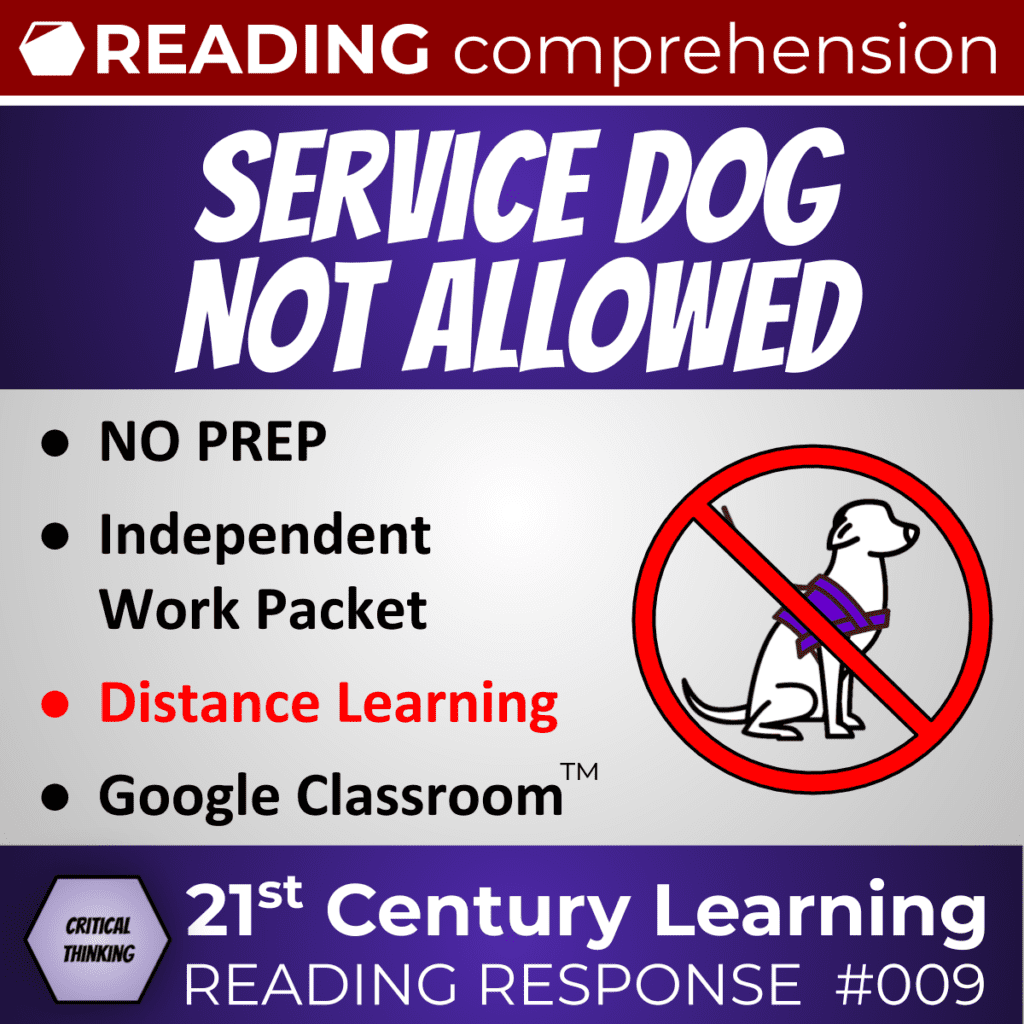
This informational text is about Critical Thinking and how to seek out high quality information from both sides to help make an informed opinion about controversial topics.
In Canada, a Human Rights Tribunal said it was okay for a school to deny a boy with autism his service animal in class. This ruling is controversial. It has sparked debate over service dogs in school. It also shows barriers that students with disabilities face in the education system.
The take-away message is that we can make more informed decisions by becoming full minded.
It’s important to think about the information you have. Then, try to figure out what information you might be missing. Finally, we need to go out and look for that missing information and consider how it might be right.
Students get an opportunity to think about different points of view:
- the parents who say this is discrimination,
- the school board who says what they provide is enough,
- the human rights tribunal that agrees with the school board,
- and an accessibility lawyer that says the human rights tribunal failed.
6 Things you need to know:
- Kenner Fee is a 12 year old boy who has autism. His service dog Ivy helps him function.
- In Grade 2, he was not allowed to bring his service dog to class. The school said the dog was not needed.
- The parents filed a human rights complaint based on discrimination.
- The school board psychologists and specialists felt the accommodations the school provides is enough to help this student succeed.
- The Human Rights tribunal considered evidence presented from both sides at the hearing.
- They ruled this was not discrimination because the school is accommodating the boy and the family didn’t successfully prove the dog would help.
Watch the following video:
CTV NEWS report on Sep 2, 2017. Dog denied: Tribunal says service dog hinders autistic boy’s education https://youtu.be/Z6vO_wTERNk
5 Points of View to think about
Quote #1:
Global News summarizing the ruling of the Human Rights Tribunal
“The decision says Kenner Fee’s family failed to prove that having his black Labrador Ivy in the classroom would help him with his education.
[The Human Rights Tribunal] found that the Waterloo Catholic District School Board took all necessary steps to evaluate whether the dog was needed in the classroom, and supported the board’s decision not to allow the service animal to sit beside Kenner during lessons.
SOURCE: Michelle McQuigge, The Canadian Press for Global News August 31, 2017 Boy with autism not allowed to have service dog in class: Ontario Human Rights Tribunal
Quote #2:
Fred Gore, Director of Schools. He worked with Kenner and Ivy over the summer at a private school – St. Jude’s school is a temporary alternative to the public system for bright and gifted students experiencing learning exceptionalities
“If they can’t see that Kenner is getting upset, visibly upset, then they don’t understand autism.
He can’t function without his dog. He needs Ivy with him”
SOURCE: Fred Gore, Director of Schools
Source: CTV Kitchener News Sep 2, 2017 Dog denied: Tribunal says service dog hinders autistic boy’s education
Quote #3:
Waterloo Catholic District School Board – Excerpts from statement issued by Loretta Notten, Director of Education after they won the tribunal
“We do have a policy that allows for service dogs, and we follow a consistent process for each child and make decisions based on a case by case basis. . . . As a board we have a responsibility to all our students and must make decisions in their collective best interest, balancing our resources to serve all to the best of our ability.
SOURCE: Loretta Notten, Director of Education – WCDSB
WCDSB statement given to 570 NEWS Sep 6, 2017 Fee family to approach Ontario Ombudsman in case of son’s service dog
Quote #4:
Amy Fee – Mother of Kenner and Member of Provincial Parliament speaking about a new government directive that requires school boards
to allow a student to be accompanied by a service animal when it would support the student’s learning needs.
“For some families they’ve been struggling for years to try and get their child to be able to attend class with their service animal.
It can be a child with autism who struggles to regulate their emotions and through the use of their autism service dog is able to attend class, be with their peers and confidently participate in their education.
SOURCE: Amy Fee – Mother of Kenner and Member of Provincial Parliament
Canadian Press for Toronto Sun Sep 9, 2019 Ontario instructs school boards to develop policies for service animals
Quote #5:
David Lepofsky is a respected lawyer, professor and Chair of the Accessibility for Ontarians with Disabilities Act Alliance. He published an article about how the Human Rights tribunal failed.
“This case painfully illustrates the serious and unfair disability accessibility barriers that students with disabilities too often still face in Ontario’s education system.
It shows how families are unfairly required to repeatedly fight against the same barriers, at school board after school board.
SOURCE: David Lepofsky – Chair of the Accessibility for Ontarians with Disabilities Act
March 2020 – Lepofsky, David. Ontario’s Human Rights Tribunal Bungles the School Boards’ Human Rights Duty to Accommodate Students with Disabilities — J.F. v. Waterloo Catholic District School Board — An Erroneous Rejection of a Student’s Request to Bring His Autism Service Dog to School as cited on AODA.ca
BONUS QUOTE:
“A school board would not be viewed as being sensitive to a student’s needs if it concluded: You don’t need those eyeglasses . . . , in order to read. Glasses . . . are a form of dependency that you should avoid. We’ll instead give you large print books and documents, and that is enough to meet your needs.”
SOURCE: Annamie Paul – leadership candidate for the The Green Party of Canada
March 2020 – Lepofsky, David. Ontario’s Human Rights Tribunal Bungles the School Boards’ Human Rights Duty to Accommodate Students with Disabilities — J.F. v. Waterloo Catholic District School Board — An Erroneous Rejection of a Student’s Request to Bring His Autism Service Dog to School as cited on AODA.ca
Service dog not allowed – Is this systemic discrimination Critical Thinking Mini-Lesson
Sometimes, we make a quick decision based on limited information.
It’s easy to jump to simple conclusions about complex issues – especially when we feel passionately about the issue or the topic is controversial. (Controversy means a prolonged public disagreement about something that people feel strongly about.)
Being full minded is a critical thinking strategy we can use to help us form a logical opinion about a controversial subject. It means you try to fill your mind with high-quality information to help you make a better informed decision.
- First, think about the information you have. What point of view or perspective does this information represent? Is this primary source information directly from someone involved in the issue? Or, is this a secondary source of information that includes some opinion or analysis of a primary source of information?
- Then, try to figure out what information you might be missing. Who might have a different or opposite point of view? Where could we get information directly from the source so we can form our own opinions?
- Finally, go out and look for that missing information. Consider how it might be right. Try to be open minded as you get information that disagrees with what you believe. Start from the other point of view and work your way backwards to your point of view.
Now, you can make a more informed decision because your mind is more full.

Critical Thinking Discussion Questions
Based on this Critical Thinking mini-lesson and the information in this article, how would you answer the following questions:
Based on the article and the critical thinking mini-lesson, how would you answer the following:
- Why does the school board not allow Kenner to have his service dog in class?
- What reasons can you find that are directly stated?
- What reasons can you find that are implied?
- Why does Kenner and his family want the service dog in class?
- What reasons can you find that are directly stated?
- What reasons can you find that are implied?
- What barriers (if any) did Kenner’s family face trying to get the school to allow their son’s service dog in class?
- Why do you think the human rights tribunal ruling was controversial? (Controversial means a public disagreement that goes on for a while with strong emotions on both sides)
- Look at the direct quotes used in this article. How does the author show when they insert, alter or remove words in the original quote. How does this affect the reader’s ability to be full minded?
- What would help us to be more full minded in thinking about this issue? What information are we missing?
- Everyone learns in different ways. Should students be allowed to choose the way they learn in class? Be full minded as you explain your thinking.
BONUS QUESTION:
Systemic discrimination is when a system (like a government or school board) has policies that seem neutral but they actually have unfair effects on some groups of people.
Kenner is still not allowed his service dog in class. Is this an example of systemic discrimination? Why or why not?
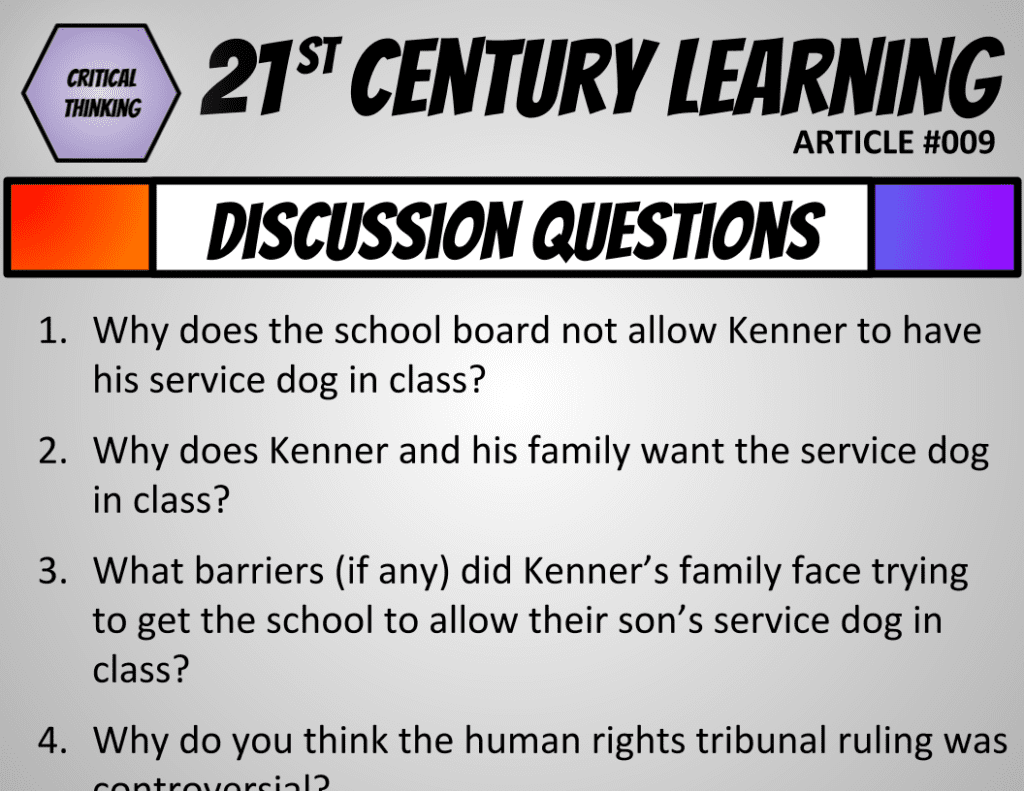
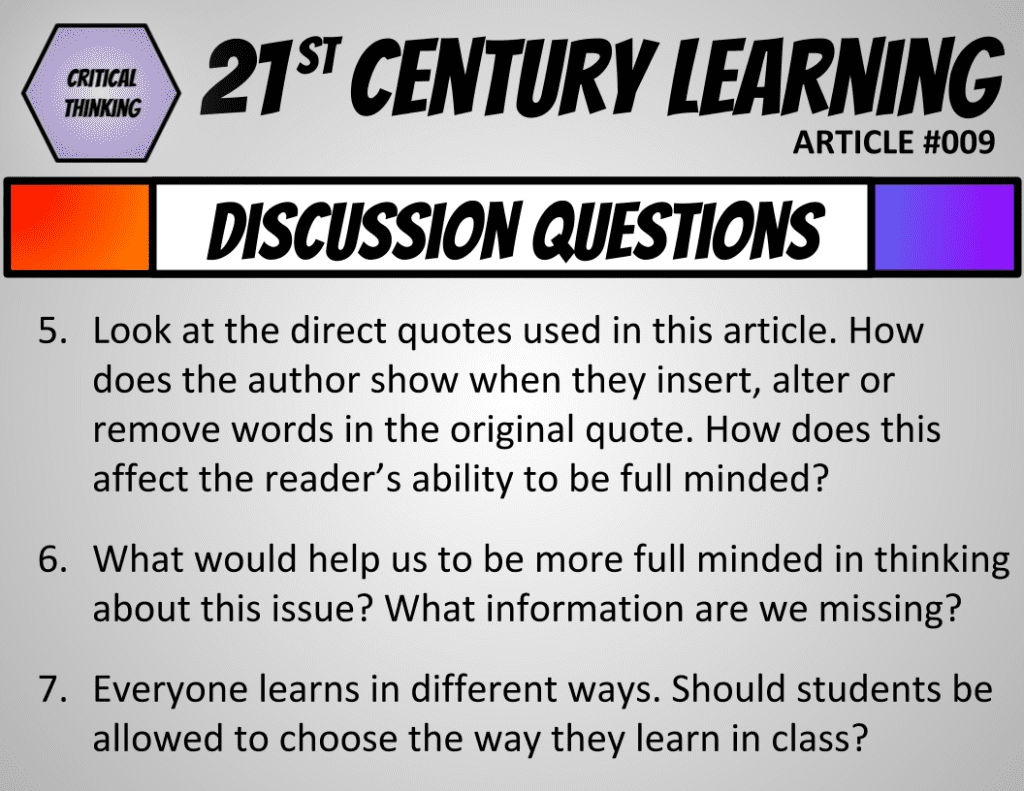
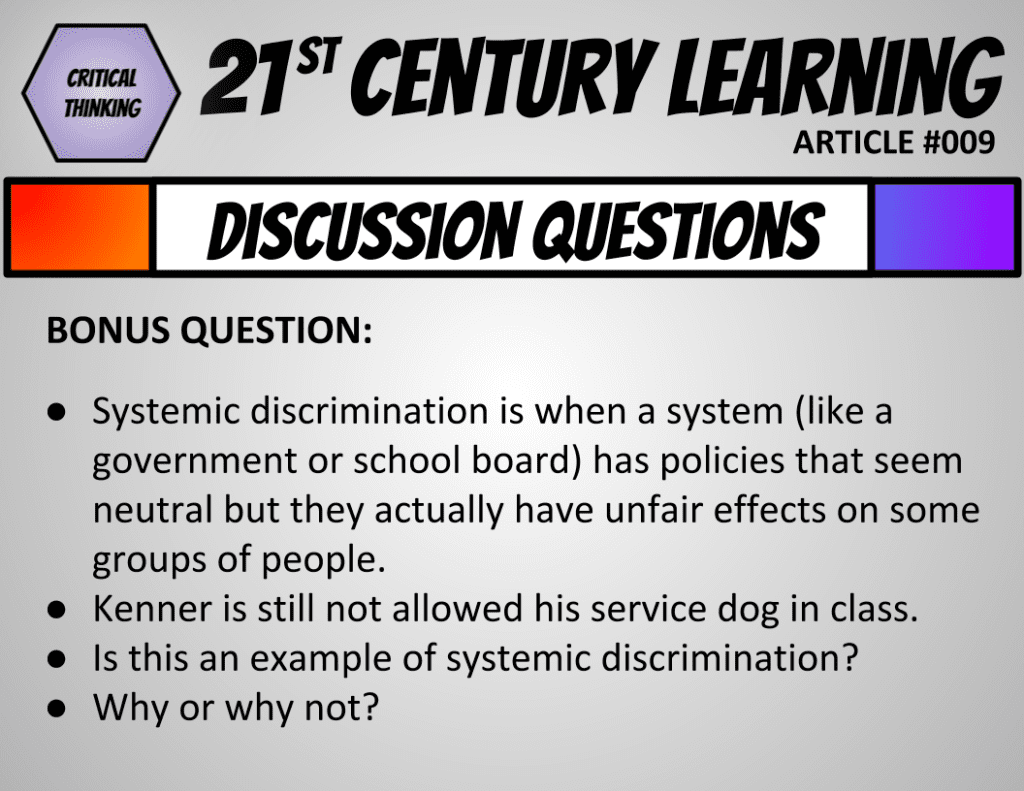
Free Green Leader Collaboration Lesson Slideshow
Link to resources used in this article:
- Human Resources Tribunal decision made on Aug 30 2017: J.F. v. Waterloo Catholic District School Board, 2017 HRTO 1121 (CanLII), http://canlii.ca/t/h5plm, retrieved on 2020-10-30
- Michelle McQuigge The Canadian Press for Global News. Boy with autism not allowed to have service dog in class: Ontario Human Rights Tribunal Aug 31, 2017
- Video: CTV NEWS Sep 2, 2017. Dog denied: Tribunal says service dog hinders autistic boy’s education https://youtu.be/Z6vO_wTERNk
- WCDSB statement given to 570 NEWS Fee family to approach Ontario Ombudsman in case of son’s service dog Sep 6, 2017
- Toronto Sun Sep 9, 2019 Ontario instructs school boards to develop policies for service animals
- Lepofsky, David. Ontario’s Human Rights Tribunal Bungles the School Boards’ Human Rights Duty to Accommodate Students with Disabilities — J.F. v. Waterloo Catholic District School Board — An Erroneous Rejection of a Student’s Request to Bring His Autism Service Dog to School as cited on AODA.ca
- Educircles Critical Thinking Lesson Plans
